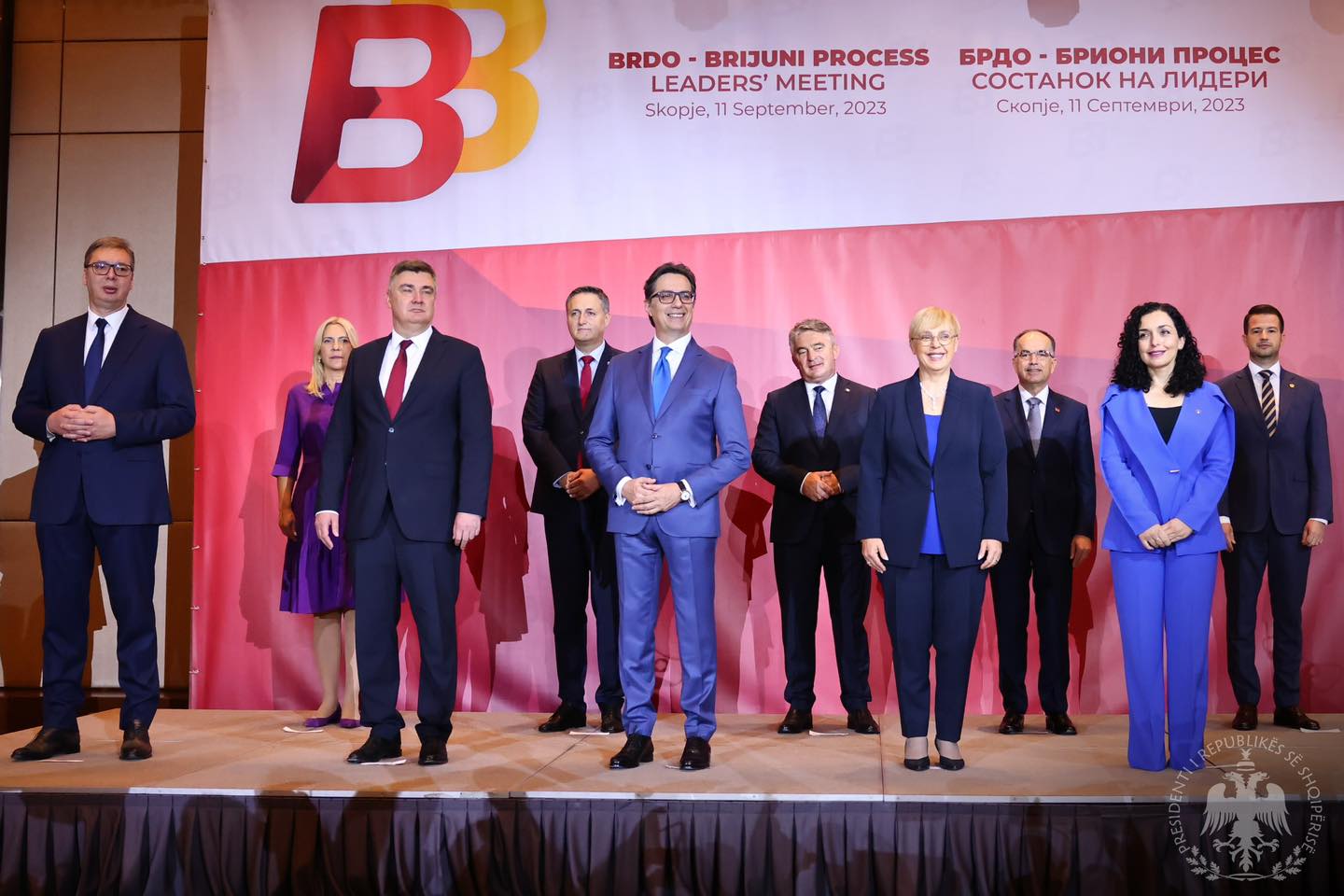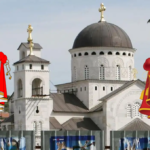The 12th summit of the Brdo-Briona process was held in Skopje. European integration of the Western Balkans, youth policy, and climate change were the focus of talks. The meeting was hosted by the President of North Macedonia, Stevo Pendarovski, and the Presidents of Croatia and Slovenia, Zoran Milanović and Natasha Pirc Musar. In addition to the mentioned leaders, President of Serbia Aleksandar Vučić, President of Kosovo Vjosa Osmani, President of Montenegro Jakov Milatović, President of Albania Bajram Begaj, and members of the Presidium of Bosnia and Herzegovina Zeljko Komšić, Denis Bečirović, and Zeljka Cvijanović took part in the meeting.
The Brdo-Brijuni Process, which is a Slovenian-Croatian initiative launched in 2010 by the then Prime Ministers of Slovenia and Croatia, Borut Pahor and Jadranka Kosor, aimed at strengthening mutual trust and regional cooperation, with the aim of faster integration of the Western Balkans into the EU. The inaugural summit of the Brdo-Brijuni Process was held in 2013 in Brdo near Kranj. The main goal is the full integration of the countries across the region into the European Union and stabilization in the Western Balkans through the strengthening of regional cooperation and the resolution of controversial issues.
The leaders of the countries participating in the Brdo-Brijuni Process adopted a declaration in which they advocated the preservation of peace and stability and activation of strategic dialogue with the institutions of the Union, in order to speed up the accession process and prevent the neglect of the region. Regarding Russian aggression against Ukraine and its possible spilling over to the Western Balkans, the need for a strong, stable, and inclusive European Union was emphasized. The declaration underlines the need for the EU, as well as the Western Balkans, to be ready for enlargement as soon as possible and no later than 2030. Comprehensive political, economic and social reforms are seen as key to joining the EU, therefore it is necessary to intensify efforts to implement reforms in order to strengthen the rule of law and ensure better functioning of democratic institutions and state administration. It was confirmed that regional cooperation and good neighborly relations are important for progress towards the EU, as well as the creation of an atmosphere of mutual trust, understanding, peaceful and permanent resolution of open bilateral issues. The importance of achieving benefits for the citizens of the Western Balkans even before formal accession has been highlighted, so the EU is invited to consider opening up ways to allow the region to gain access to specific EU policies, initiatives, and funds to bring the benefits of EU membership closer to citizens. In this sense, the urgency of using a new negotiation methodology to accelerate the process of accession to the EU on the basis of merit and to ensure the progress of the gradual integration of the EU and the region during enlargement was emphasized. With regard to the environment, it is noted that there is a need to better address the challenges of climate change, green transition and green growth, together with better energy diversification and transition to renewables. Summit participants welcomed the EUR 1 billion energy support package for the Western Balkans, with which the EU extends solidarity measures taken after Russia’s aggression against Ukraine, such as support for vulnerable households and the construction of new energy infrastructure. The declaration emphasizes the need to keep young people in the Western Balkans region, as their outflow has significant implications for long-term societal viability, sustainable economic growth, and social progress.
President Pendarovski of North Macedonia noted that all states in the region without exception are willing to achieve membership in the EU. It is clear to everyone that countries must strive toward European standards of good governance and a functional market economy. Stability and prosperity in the region are interdependent. When asked whether solving mutual problems and relations with individual EU members is more important than fulfilling the criteria, Croatian President Milanovic said that both are important. There are unresolved issues, especially between Serbia and Kosovo, which are not mutually recognized, and these are parallel, yet interwoven processes, and this type of dialogue is valuable. The worst thing when the phone lines are silent is the death of dialogue, communication, and mutual understanding, which leads to confusion. According to Milanovic, “one of the unusual moments from the point of view of identity and self-esteem in recent history was the moment when Ukraine received candidate status ahead of Bosnia and Herzegovina. It was weird, but it happened.” President of Slovenia Pirc Musar assessed that the discussion at the Brdo-Briona Process meeting took place in a constructive and peaceful tone and that the participants paid most attention to the EU topic. She noted that the parties finally agreed on the text of the Declaration and ultimately adopted it, which turned out to be impossible last year. Together with the declaration, for the first time, concrete actions were also agreed upon: to include mobile roaming across the countries of the Western Balkans into the European network and to join the countries of the region to the EU facility for responding to natural disasters.
Željka Cvijanović, a member of the Presidium of Bosnia and Herzegovina, said that “the conversation took place in a peaceful and nice atmosphere, without serious issues.” Chairman of BiH Presidium Željko Komšić noted how easy it was to discuss some really serious things, such as speeding up the path to the EU, decarbonization, and the outflow of youths from the entire region. Another member of the Presidium of BiH, Denis Bečirović, noted that regional cooperation as a whole has become an important aspect of strengthening stability and security.
Serbian President Aleksandar Vučić told reporters in Skopje that the Brdo-Briona summit was really honest and constructive. Most of the talk was about the relationship between the Western Balkans and the EU and what they might be asking for. Vučić said that some have a little more enthusiasm, while some have less. “There were no big arguments and squabbles as Pristina and I reserved our problems for Thursday when we met in Brussels.” He also commented on the statement of Prime Minister Kurti, who said that “it is impossible to separate Serbia from Russia without a whip”: “It is a shame that someone who considers himself the leader of anything, no matter how highly he thinks of himself, uses such language and such vocabulary.”
The 12th Brdo-Briona summit can be considered generally successful. A joint declaration was adopted in Skopje, which became an important document in the promotion of the countries from the region to membership in the European Union. Despite the different degree of readiness of states to join the EU, the opinion regarding membership for all Western Balkan countries in the European Union by 2030, which was actually put forward by Brussels at the EU-Western Balkans summit in Athens, was fully supported by the head of the European Council Charles Michel. Obviously, the speech of the Serbian head of state was more skeptical between the lines, but he did not abandon the course toward European integration. He only mentioned certain difficulties in its implementation. Slovenia and Croatia understand very well the needs of the countries in the region in the implementation of their European integration policy, therefore the support of Ljubljana and Zagreb is significant and constructive and is appreciated by all participants in the Brdo-Briona process.
The following years will be decisive in relation to the European integration progress in the region, however, one should not rule out attempts by Russia and its closest ally in the region, Milorad Dodik, to block the process. This is possible only if active hostilities ignite, and this is exactly the task Moscow has set before Banja Luka. The statement of the former president of Croatia, K. Grabar Kitarovic, emerged by no accident. She stated in an interview that at one time Putin told her that he did not deliberately prevent Slovenia and Croatia from joining the EU, but as for other countries in the region, the Kremlin will stand categorically against the move. Dodik’s latest steps towards an open confrontation only confirm these words, and the Kremlin is currently significantly limited in its resources to influence the European integration progress of the Western Balkan countries. This is well understood in Brussels and the capitals across the region.



